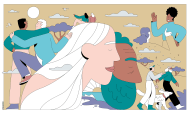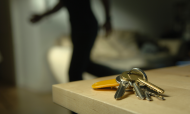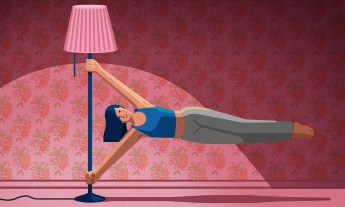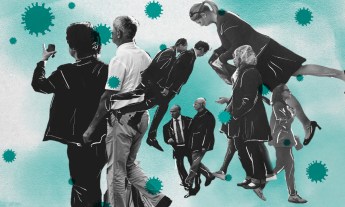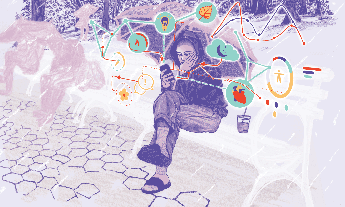
Good Anxiety is the title of the new book from NYU neuroscientist Wendy Suzuki PhD — but it’s one that will surprise those of us who think of anxiety as strictly bad news. However, through her work, Suzuki has come to find, as she writes, that “anxiety can shift from something we try to avoid and get rid of to something that is both informative and beneficial.”
The key is taking the information that your anxiety is telling you and using it to live in ways that support your well-being. Below, she explains how to evaluate the ways you cope with stress and change them for the better.
In the face of stressors and the anxiety they often trigger, we all develop coping strategies to manage and get ourselves back on track. These go-to behaviors or thought processes often function automatically, beneath our conscious awareness, and many were developed when we were younger and less mindful.
We developed these coping mechanisms to self-soothe or avoid uncomfortable feelings. But when these coping mechanisms stop working to manage stress, they tend to make matters worse, exacerbating our anxiety and undermining our belief that we are in control of our lives.
If you cope in ways that are productive for you, then your anxiety is probably under control. But if you cope in ways that undermine your health, job, safety or relationships, it may be time to consider your options.
What’s more, our coping strategies often reflect our relationship to anxiety. If you cope in ways that are productive for you, then you probably have your anxiety under control. If you cope with stress in ways that undermine your health, job, safety or relationships, it may be time to consider your options.
In general, coping mechanisms are considered to be either adaptive (good at helping us manage the stress) or maladaptive (bad for us because they cause other damage, through avoiding a problem that then gets bigger or giving us another problem, as with alcohol dependence or abuse). When the feelings underneath these behaviors are left untouched or unprocessed, those components of anxiety will grow and stay stuck. Then our negative coping behaviors only end up reinforcing our inability to manage or regulate our feelings.
Take Liza, a hard-driving career woman. A graduate of a top-ranked business school, she dove into a career in financial services and is well liked and well respected by colleagues. But suddenly she’s 41 with no life outside of work. She’s a workaholic, and up until now all of this dedication and motivation to succeed has paid dividends to her bank account and sense of self-worth.
But lately she goes home to her apartment feeling totally burned out. She drinks three to four glasses of wine to relax and fall asleep. Her alarm gets her up at 5AM so she can go for a run and make it to the office by 7AM. This is her cycle and it has worked for her for years, but not anymore. Liza now wakes up already feeling depleted. She is lonely, plagued with self-doubt, and beginning to question what is driving her so hard.
Then, if you respond by isolating yourself, you remove the opportunity for encouragement and support from your social relationships and take away a vital bad-anxiety buffer.
To better understand how this happens, it can help to take a look at what is actually happening in the body when bad anxiety takes the wheel. In short:
• When your brain-body is under chronic strain from anxiety, your capacity to manage emotions becomes downregulated — less effective at responding to internal or external stimuli. You become highly sensitive to stress of any kind and can begin to feel self-doubts and a loss of confidence.
• Next, when your body is depleted and doesn’t get enough restorative time and rest, it will not be able to kick up your motivation, the predominant emotion of a positive mindset. This inability to reset further erodes the capacity to maintain emotion regulation.
• Then, if you respond by isolating yourself, you remove the opportunity for encouragement and support from your social relationships and thereby take away a vital bad-anxiety buffer.
• Further, if you look to drugs or alcohol for relief, you may unintentionally exacerbate your anxiety once the “high” has passed. Indeed, drugs and alcohol act as a depressant on the nervous system. They also interfere with the brain-body’s processing of dopamine and serotonin, giving you a false sense of relief from anxiety.
It is entirely possible to change your current negative ways of coping with anxiety and also their underlying effects on your brain and body.
These responses represent a downregulation in functioning of various neural pathways of the brain-body. Yet for all these negative coping strategies and their drawbacks, a silver lining can emerge: It is entirely possible to change your current negative ways of coping with anxiety and also their underlying effects on your brain-body.
Restoring emotion regulation requires energy, curiosity and recognizing that you have a choice. But it is absolutely possible for any of us to learn to recognize signs of our own physical depletion and/or emotional dysregulation and begin to make changes. This is the essence of how using good anxiety works.
When you are anxious or upset what do you typically do to calm yourself? Without overthinking, read through the following common negative coping techniques. Which are familiar to you?
Negative Ways to Cope
• Use or abuse alcohol or drugs
• Act violently toward others
• Act out or misbehave on purpose
• Avoid conflict
• Rationalize or blame others for your problems
• Deny there is a problem
• Repress or forget what has happened
• Behave like someone you are not
• Disassociate yourself from a situation
• Exhibit controlling behavior
• Become a workaholic
• Isolate yourself and withdraw from activities and others
• Feel like you need to control or manipulate others
• Refuse to communicate
• Fantasize regularly
• Catastrophize
• Help others over helping yourself
Next, go through the list of positive coping techniques — these are beneficial ways of managing anxiety.
Positive Ways to Cope
• Name your feelings, positive or negative
• Control your anger
• Practice self-reflection
• Seek support from friends and family
• Communicate or talk about your feelings
• Exercise
• Participate in hobbies and/or sports
• Spend time outdoors
• Consider a situation from another point of view
• Remain flexible and open to new ways of thinking
• Keep a journal or engage in another form of conscious self-reflection
• Spend quality time with family, partner, friends
• Use positive self-talk and affirmations
• Meditate or pray
• Clean or organize your workspace or home
• Seek support from a health professional when you need it
• Playing or being with a pet or children
Without judging yourself, ask yourself this: What, if any, of your go-to ways of coping with stress are helping you? Are any hindering you, or having unwanted secondary effects? Also, which of these coping strategies could you do more of?
The more you stay unaware of how your coping mechanisms are no longer benefiting you or giving you the mental break you need, the more intense your bad anxiety will be.
It’s important to be aware of how we respond to stress and feelings of anxiety. The use of more than two or three negative coping strategies can be an indication of being stuck in bad anxiety; on the other hand, use of positive coping strategies shows a tolerance of stress and flexibility around emotions.
Our relationship with anxiety likely changes over time, as does our ability to process it, so our coping strategies necessarily have to be updated and ones that are maladaptive need to be addressed. And sometimes this process requires some work.
The more you stay unaware of how your coping mechanisms are no longer benefiting you or giving you the mental break you need, the more intense your bad anxiety will be and the more entrenched your negative coping strategies will become. But once you see your situation for what it truly is — a case of an overdue update to your coping strategies — you’ll be able to start changing aspects of your situation and orient yourself to a more satisfying life.
Excerpted from the new book Good Anxiety: Harnessing the Power of the Most Misunderstood Emotion by Wendy Suzuki PhD with Billie Fitzpatrick. Copyright © 2021 by Wendy Suzuki PhD. Reprinted by permission of Atria Books, a Division of Simon & Schuster, Inc.
Watch Dr. Wendy Suzuki’s TED Talk about the transformative power of exercise here:


